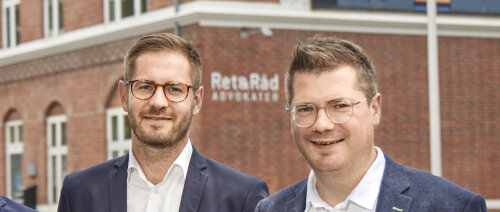Best Energy Regulatory Law Lawyers in Viborg
Share your needs with us, get contacted by law firms.
Free. Takes 2 min.
List of the best lawyers in Viborg, Denmark
About Energy Regulatory Law in Viborg, Denmark
Energy Regulatory Law in Viborg, Denmark, forms part of the national legal framework that governs the production, distribution, and consumption of energy. This area of law comprises regulations issued by Danish and European Union authorities to ensure fair competition, promote sustainable energy use, and protect consumer rights. In Viborg, adherence to these rules is vital for individuals, companies, and public institutions involved in the energy sector, including renewable energy, electricity, natural gas, and heating networks. The law covers licensing, tariffs, grid access, environmental compliance, and dispute resolution, reflecting Denmark's commitment to a green energy transition.
Why You May Need a Lawyer
Energy Regulatory Law is complex, and navigating its requirements can be challenging. You may need a lawyer if you encounter the following situations:
- You are planning to establish or invest in an energy project, such as a solar or wind facility.
- You have a dispute with an energy supplier or grid operator regarding tariffs or service quality.
- Your business is seeking regulatory approval or facing compliance investigations by authorities.
- You need help understanding the environmental implications of an energy initiative.
- You are challenging a governmental or municipal decision affecting your energy interests.
- You wish to participate in public tenders or contracts involving energy supply in Viborg.
- You need guidance on consumer rights or obligations related to energy consumption.
Local Laws Overview
Energy Regulatory Law in Viborg is primarily governed by national legislation, including the Danish Electricity Supply Act, the Renewable Energy Act, and the Natural Gas Supply Act. These laws are complemented by EU directives and regulations. Key local elements include:
- Licensing requirements for energy producers, suppliers, and grid operators.
- Rules for connection and access to electricity and heating networks managed by Viborg's utility companies.
- Consumer protection laws mandating transparent pricing and complaint handling procedures.
- Regulations to encourage renewable energy projects and local energy communities.
- Municipal influence over district heating, energy planning, and infrastructure development in Viborg.
- Environmental impact assessments for large-scale energy projects, in line with both national and EU standards.
Frequently Asked Questions
What is Energy Regulatory Law?
Energy Regulatory Law involves the rules that control how energy is produced, distributed, traded, and consumed. It aims to ensure fair competition, protect consumers, and meet environmental objectives.
Who regulates the energy sector in Viborg?
The energy sector in Viborg is primarily regulated by national authorities, especially the Danish Energy Agency and the Danish Utility Regulator, with the local municipality also having specific responsibilities.
Do I need a permit to produce renewable energy in Viborg?
Yes, depending on the size and type of your project, permits from national or municipal authorities may be required along with compliance with environmental and safety rules.
How are energy prices regulated?
Energy prices, especially for electricity and district heating, are regulated to ensure they are fair and transparent. The Danish Utility Regulator monitors these prices.
What rights do energy consumers have in Viborg?
Consumers have rights to clear information about prices, reliable supply, effective complaint mechanisms, and in some cases, the ability to switch suppliers.
Can I challenge a utility company's decision?
Yes, if you disagree with a decision or face issues with a supplier or grid operator, you can file a complaint with the company or take your case to the Danish Energy Complaints Board.
Are there incentives for sustainable energy projects in Viborg?
Yes, there are national and local incentives, including grants, feed-in tariffs, and tax credits for renewable energy projects. These are subject to specific eligibility criteria and application processes.
How does Viborg municipality influence energy projects?
Viborg municipality is involved in energy planning, granting of local permits, and the development of district heating infrastructure. It also works to promote energy efficiency and sustainability locally.
What is the role of environmental laws in energy projects?
Environmental laws ensure that energy projects consider their impact on nature, emissions, and public health. Projects may need to undergo environmental impact assessments and comply with both Danish and EU environmental standards.
How can a lawyer help with energy regulatory issues?
A lawyer can assist with licensing, compliance, contract negotiation, dispute resolution, representation before authorities, and keeping you informed about developments that may affect your interests.
Additional Resources
If you need further guidance or information about Energy Regulatory Law in Viborg, Denmark, consider reaching out to the following resources:
- Danish Energy Agency - For regulations, permits, and guidance on national policies.
- Danish Utility Regulator - For information on price regulation, consumer rights, and market supervision.
- Danish Energy Complaints Board - For dispute resolution between consumers and energy suppliers.
- Viborg Municipality Technical and Environmental Department - For inquiries related to local permits and energy planning.
- Danish Bar Association - To find qualified lawyers specializing in Energy Regulatory Law.
- Danish Consumer Council - For support regarding energy consumer rights.
Next Steps
If you require legal assistance in the field of Energy Regulatory Law in Viborg:
- Identify your specific issue or question related to energy law, such as licensing, disputes, or regulatory compliance.
- Gather all relevant documents, such as contracts, permits, correspondence, and regulatory notices.
- Contact a lawyer with expertise in energy regulatory matters. Many law firms and independent lawyers in Denmark offer initial consultations.
- Consult reputable resources or reach out to relevant authorities mentioned above for additional support or second opinions.
- Consider mediation or formal complaint processes if your dispute involves a supplier or regulator and cannot be resolved informally.
Lawzana helps you find the best lawyers and law firms in Viborg through a curated and pre-screened list of qualified legal professionals. Our platform offers rankings and detailed profiles of attorneys and law firms, allowing you to compare based on practice areas, including Energy Regulatory Law, experience, and client feedback.
Each profile includes a description of the firm's areas of practice, client reviews, team members and partners, year of establishment, spoken languages, office locations, contact information, social media presence, and any published articles or resources. Most firms on our platform speak English and are experienced in both local and international legal matters.
Get a quote from top-rated law firms in Viborg, Denmark — quickly, securely, and without unnecessary hassle.
Disclaimer:
The information provided on this page is for general informational purposes only and does not constitute legal advice. While we strive to ensure the accuracy and relevance of the content, legal information may change over time, and interpretations of the law can vary. You should always consult with a qualified legal professional for advice specific to your situation.
We disclaim all liability for actions taken or not taken based on the content of this page. If you believe any information is incorrect or outdated, please contact us, and we will review and update it where appropriate.









